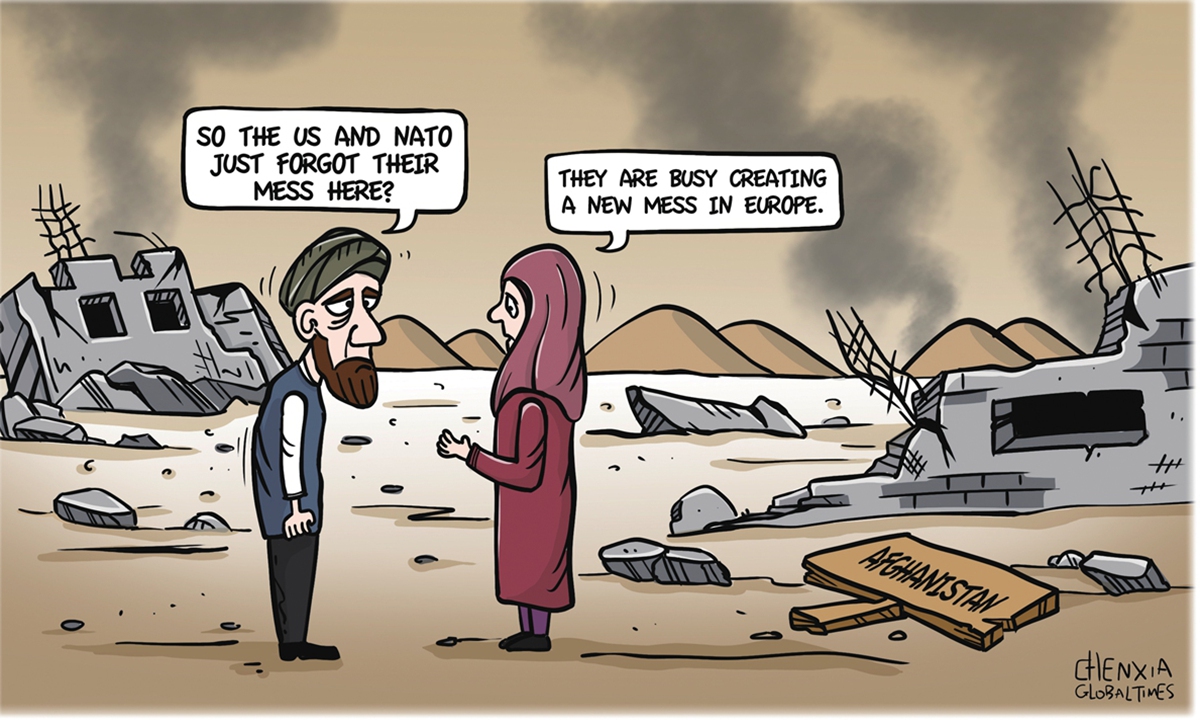
Afghanistan Illustration: Chen Xia/GT
August 15, 2021 represents a national tragedy for many Afghans, an inglorious event for the US and its Western allies, a turning point for regional stability and global security.
Since its inception as a modern nation-state in the early twentieth century, Afghanistan's stability and prosperity have been held hostage by its internal fissures and global actors. From European colonial powers' competition in the 19th century, the Cold War rivalries of the Eastern and Western blocs, to global Jihad against the secular world, Afghanistan has been dragged into regional and global battles.
The US has been a leading actor in Afghanistan's multi-faceted conflict and a contributor to Afghans' miseries.
The US was the key supporter of the Mujahideen groups during the Soviet intervention in Afghanistan in 1980s, alongside other anti-Soviet allies. The Western-supported war succeeded in toppling Afghanistan's secular and leftist government, accelerating the collapse of the Soviet Union and its Eastern bloc. The Arab Mujahideen then turned their rage and ambition against the West, which culminated in the September 11 attacks.
The terrorist attacks on the US soil brought back the US into Afghanistan. While US' primary objective was Al Qaeda-centric, it initially recognized the importance of building a modern, moderate and democratic Afghan polity, supported by regional and international stakeholders.
The US' intervention was overwhelmingly supported by many countries, key political and ethnic groups in Afghanistan, and the UN. However, since 2006 onwards two trends began to challenge the post 2001 political consensus: the revival of an anti-American alliance and America's return to its geopolitical ambition in West Asia. In other word, geopolitics replaced the global war against terrorism.
While fragile and dependent on external support, various Afghan political, social, and military institutions were functioning prior to the US' departure. For example, the Taliban started to occupy major Afghan cities in July 2021. However, the US' exceptionalism was demonstrated in planning and executing its cruel and incompetent withdrawal from Afghanistan.
The US' exclusion of Afghans from its negotiations with the Taliban, ignoring European allies and regional calls for a responsible withdrawal, bypassing the UN, and its decision to suddenly cut all logistical support to Afghanistan's military forces caused major logistical disruption and a psychological tsunami, prompting Taliban's successful blitzkrieg in August 2021.
The collapse of Afghanistan's post 2001 constitutional order proved to be the second defeat of a secular global power by their foes.
China and Afghanistan are endowed with rich and ancient civilizational identity and heritage. Historical, political, economic and security factors have elevated China into an important stakeholder for the stabilization and development of Afghanistan.
Only a functioning, modern, inclusive and moderate government in Afghanistan will end the Afghan peoples decades-old miseries, while protecting its neighbors, advancing global security and empowering nascent secular forces in the Islamic World. Pax Americana could not sustain such a polity. This endeavour urgently requires UN's strong leadership to initiate an inclusive political process to bring together all Afghans including the Taliban, regional and global stakeholders to map a meaningful political process.
Instead of its provocative gestures in Taiwan, the US should learn lessons from its costly Afghan intervention and humiliating departure by supporting a UN-led process of stabilization and development of Afghanistan.
The author is the founder and the first director-general of the Afghan Institute for Strategic Studies. opinion@globaltimes.com.cn




